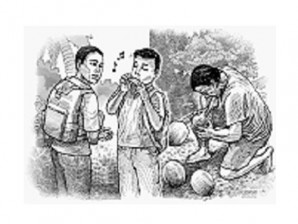The gift outright
Whenever I see a certain ornamental plant, which the school I first went to used as a border around the buildings, a boy, a year older than me, comes to mind. Our fathers were chums. They were both schoolteachers, and would play chess in our house about every other night. Although we were not classmates, we were drawn toward each other by the closeness of our parents. Without a word, he would give me part of his snack, shredded coconut meat cooked in sugar, and I would give him some of my boiled bananas, as though it was assumed that we should feed each other. But only during recess.
In particular, I associate him with the plant. Each time we happened to walk together, he would pick a leaf off the shrub, put it to his lips and blow on it, and it would vibrate and give out a tune, that of a song that we children liked to sing, “Laylay sa Payag.”
He did it so well that in my opinion he could have gone on to playing before audiences and eventually making a name for himself as a specialty musician. In time, with determination, he could learn how to play Vivaldi’s “Four Seasons,” but this would require a pail of leaves, perhaps four, one pail for each season, for added effect, the yellowish or brownish leaves reserved for autumn.
My friend’s talent might seem modest if we allow that there are people who could play a tune with a saw, in which case I desperately hope that, aside from producing music, they could as well cut nice wooden planks with the tool.
Not too long ago, the wife and I joined a tour of an island, one of the features of which was a visit to a farmer who could unhusk a coconut using his teeth. He could not have done it with a ripe, brown coconut, but even a green one would need a bolo to be stripped to its shell, or, which is faster, to be lopped at one end close enough for the shell to yield a hole through which one may drink the sweet water. Or, if the last is not wanted, to be split right in the middle.
Article continues after this advertisementThis man dug his teeth into the husk and tore it up in record time.
Article continues after this advertisementImpressed, I picked up a coconut and stood beside him and asked the wife to take a photograph of us in the act of gashing the husk with our incisors.
I maintain that God has given each of us a special talent. What it is is for the individual to find. (If a person dies without knowing it, then perhaps his talent is dying.) But usually the person knows his gift or gifts. A voice with an elaborate coloratura for some, sprightly dancing feet for others. Someone with a plain face, or faulty speech, should not be dismissed. He or she could whip up an intensely delightful dessert, or could vault over the highest fence in the neighborhood, without any provocation in either case.
What each of us is to do with this gift is the subject of Jesus’ parable in the Gospel of Matthew. A man who was going on a journey entrusted his possessions to his servants. To one he gave five talents; to another, two; to a third, one. Matthew explains the difference with this phrase, “to each according to his ability.”
The one who received five talents traded with them and made another five. Likewise, the one who received two made another two. But the man who received only one buried his master’s money in the ground.
When the master returned, he commended the first two servants for being faithful and gave them great responsibilities, and condemned the third servant who justified his act of burying the talent by saying that he feared the master for being a “demanding person, harvesting where you did not plant and gathering where you did not scatter.”
As to myself, perhaps I have the gift of eavesdropping and using what I hear in poems. It might seem like stealing, but I am really just putting the words of others to good use — for the sake of art and hopefully for the glory of God too.
When the 5-year-old son of a cousin died and the menfolk were putting together oddments of wood lying about for a coffin, and a man looking at the box remarked that it was not planed and not smooth, someone said with instant wisdom, “It does not matter, it is just a coffin.”
When I got home, I wrote a short poem, the last line of which was, “No coffin is ever a work of art.”
Even the title of my first book of poems was filched from a comment made by a fellow seminarian, who asked the rector who took him to task for coming late for prayers in the morning, “But what if one has the gift of sleep?”
